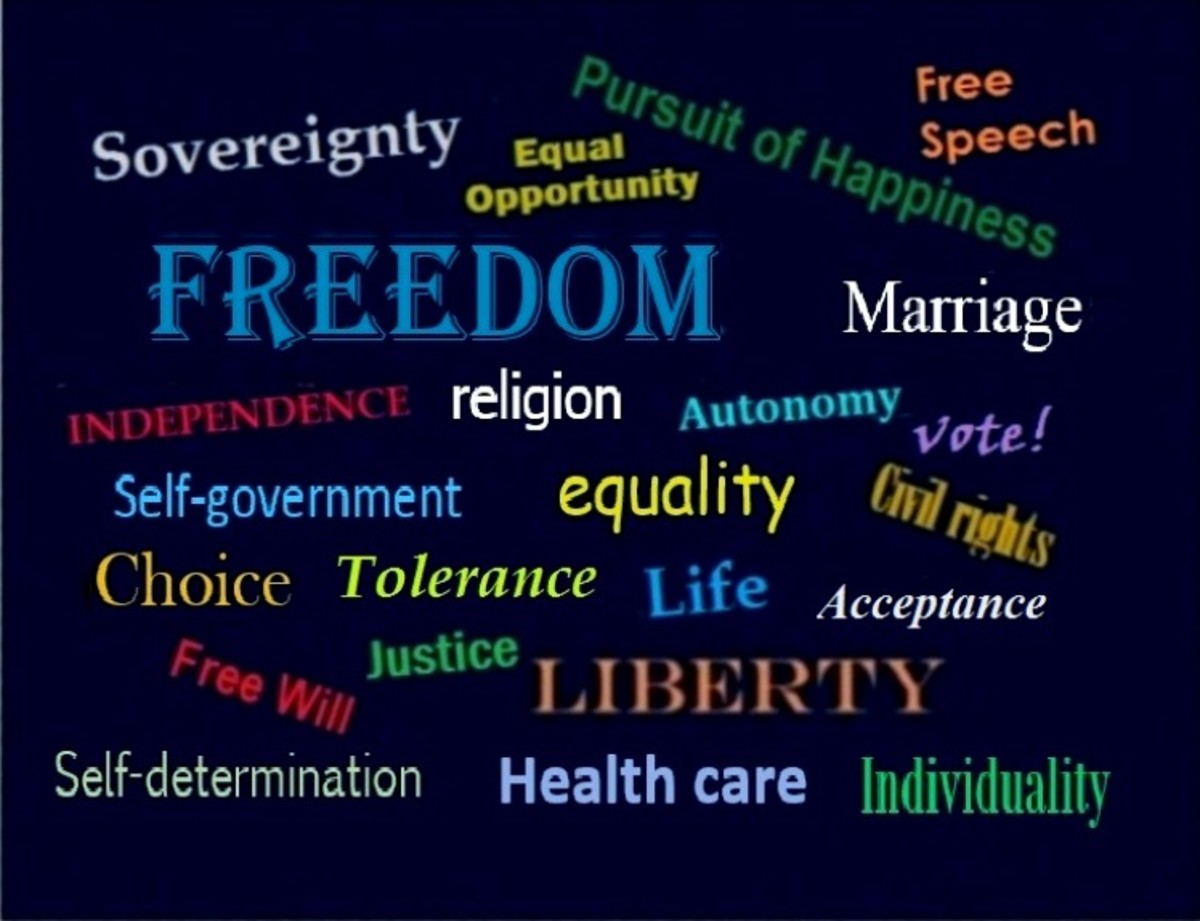American Exceptionalism - Facts And Myths
American Exceptionalism - Facts and Myths
The phrase "American Exceptionalism" has been widely used throughout most of the history of the United States. This usage seems to have accelerated over the course of the last thirty five years. Why is this and what are the sources of these assertions both in the past and now?
Many of them have originated through the rhetoric of politicians attempting to motivate their electorate to turn out and vote for them. This is most certainly a reality but it cannot explain this phenomenon anywhere near its totality. Phrases such as these must have some foundation in truth especially in regards to how the majority of its citizens perceive it. A large and significant amount of people who are not citizens of the U.S. perceive and acknowledge examples of American Exceptionalism. Many American citizens as well as foreigners dispute this term in part or in its entirety.
I believe that we need to examine all of the major sources of the assertions of American Exceptionalism to determine their legitimacy. My goal within this Hub is to do exactly that. I will examine the major assertions of American Exceptionalism within three different categories.
The first category where I will address it is in regards to the United States being a beacon for liberty and democracy. Secondly, I will examine the belief that America is a leader in innovation and technology. Then I will assess the American Exceptionalism assertions in the fields of foreign policy and foreign assistance. I will do this by examining American diplomacy, covert and overt military interventionism, and foreign aid.
Finally, I will state my overall assessments and views regarding American Exceptionalism in all of these areas. I will also explain to you why I do believe in American Exceptionalism and why this opinion is not and should not be a blanket "thumbs up" in any of these categories.
The American Revolution starting in 1776 was truly an earth shattering event. Never before in world history had a revolution been based on the liberty and natural rights of all men. This revolution was cemented in its uniqueness after the war was won when they created a republic of the people through their new Constitution of 1787.
The military leaders such as General George Washington did not violently assume power. He became the first President of the United States by way of an election and voluntarily walked away from this office eight years later. This was unprecedented in world history.
Unfortunately the United States Constitution was also a document that resulted from several political bargains with the devil. The primary and most hideous bargain or compromise was to allow slavery to remain legal in the U.S. until 1808. This would be the earliest point where Congress would be allowed to impose its will upon the institution of slavery in any way.
Furthermore it allowed the slave states to count each slave as 3/5 of a person for purposes of establishing the size of a state's delegation to the House of Representatives as well as the amount of electoral votes they would have in the Presidential elections. Most of the states also only allowed propertied white men to vote.
The flip side of these very negative aspects of the Constitution is the highly elastic quality of the document. Our nation has been able to evolve over these past 225 years due to the inherent mechanisms within the Constitution for change. These changes take far too long to become realized but they do eventually occur.
Our history shows that we are continually opening ourselves up to more civil rights for a wider swath of our population. This started with the abolition of slavery, through the adoption of the Constitutional amendment granting women the right to vote, through Civil Rights legislation during the 1960's, and onward now to LGBT rights including same sex marriage.
One other contradiction in American history regarding liberty and democracy is the tug of war we continually conduct over immigration issues. We have always held ourselves out as a beacon to people of other nations searching for a better life. The poem by Emma Lazarus entitled, The New Colossus, states, "Give me your tired, your poor, your huddled masses yearning to be free". Many Americans can trace their roots back to Ellis Island. We feel in our hearts a kinship with Emma Lazarus' sentiments.
History, on the other hand, suggests that we have usually objected to large influxes of immigrants especially during tough economic times. The Chinese in the nineteenth century were horribly discriminated against. Irish and Italian immigrants often found it extremely difficult to find meaningful employment early in the twentieth century. Hispanic immigrants are feeling the same backlash now. These examples show that we are and have been both a beacon for immigrants as well as a very discriminating nation.
I will now turn to the area of innovation and technological progress. My father often emphasized to me as a child the assertion that America had the "can do" attitude and that we would always find a way to solve a problem. Throughout most of American history this concept has certainly rung true.
We were a leader during the Industrial Revolution and more recently during the early days of the present Technological Revolution. That can do attitude was clearly on display through our inventors, pioneering businessmen, and also through our political leaders. Our government facilitated the key infrastructures along with first rate public education that allowed these innovators to flourish.
The Eisenhower administration funded the building of our national highway system in the 1950's which has greatly enhanced the improvement in logistics for American business. President Eisenhower initiated this project primarily for national security interests in time of war but this logistics benefit was welcomed by all. Two national agencies have been at the forefront of creating major technological advances for the benefit of both their organizations and society as a whole.
The initial beginnings of the internet were created by The Defense Advanced Research Projects Agency (DARPA) funding. The Defense department had a strategic need to share information between different departments efficiently and securely. This funding launched the nascent seeds of the internet we know today. DARPA funding has created many more of these innovations that are commonly used in our society today as well as in our military. Another example is Global Positioning Systems (GPS).
The inventions and innovations of The National Aeronautics and Space Administration (NASA) were created to advance the space program but have similarly been used to advance our private economy. Silicon valley and many other industries have run with their breakthroughs creating marvelous new technologies.
Unfortunately there are dark clouds on the horizon. The first is our declining national performance in education. Our children are now regularly achieving levels in mathematics and science proficiency that rank near the bottom of the developed countries of the world.
This is occurring at the same time that our colleges and universities are the envy of the world. The scientific research in both theoretical and applied science that is taking place there is simply amazing. Increasingly a much larger percent of the students who are participating in these elite research projects are from foreign countries. We still have many of our own outstanding college students but the trend line is dropping at an alarming pace.
The same declining trend line can be seen in the amount of money we invest in the crucial infrastructure that has always helped our economy prosper. The focus and drive in our current political system to invest in education, research, and infrastructure has clearly waned.
Many of our politicians talk a good game in regards to American Exceptionalism but they become Scrooge like when it comes time to follow through with much needed money to allow this phenomenon to continue to flourish. Our current politicians clearly need an American History lesson taught to them regarding what helped to create our innovative leadership.
The United States was a true foreign policy colossus and beacon of freedom following World War II. We had liberated Europe and Asia from the grips of totalitarianism by way of Germany and Japan. Furthermore our occupation of both of these defeated countries proved to be both benevolent and conducive to their relatively rapid rise back to prosperity and peacefulness.The United States also instituted the Marshall Plan which proved to be the economic fuel that placed Europe back on its economic feet very rapidly.
President Woodrow Wilson proposed the idea for the League of Nations after World War I. The Republicans and much of the U.S. rejected this proposal due to their revulsion with the rest of the world over the war and its aftermath. Therein lies much of the conundrum that is American Exceptionalism on the world stage. We are constantly involved in a tug of war between isolationism and an active foreign policy. The end of World War II saw our advocation and creation of the United Nations in New York City which was a clear successor to the League of Nations.
Sometimes this involvement devolves into self interested intervention. Examples of these can be seen throughout Latin America and the Middle East during the twentieth century. Covert and sometimes overt interventions were used in Latin America to protect American corporate interests such as for the United Fruit Company.
Similar interventions have been used to protect vital U.S. energy interests throughout the Middle East. These American interventions solely in defense of our self interests have helped to erode our post World War II positive world image as well as placing major chinks into our American Exceptionalism armor that is portrayed to the world.
This dichotomy can also be observed within our foreign aid and charitable contributions practices. We are among the world leaders in foreign aid but this aid is very uneven. Often our foreign aid is seen as and used as an extension of United States foreign policy. We wield this aid at times to simply assert our power and control around the world. It is true that all nations do this to some extent but the exercise does help to poke holes in our world image of exceptionalism.
Americans are also immensely charitable which is recognized around the world. Unfortunately we also have very short attention spans which also hurts our American Exceptionalism image to some degree.
What do all of these contradictory facts tell us? I believe that we are an exceptional nation that has led the way in freedom and democracy in the world since the late eighteenth century. Blind belief in American Exceptionalism, on the other hand, clearly is a false mindset. Blind loyalty to our government in the name of simple patriotism often leads to tyranny.
The Declaration of Independence and the United States Constitution are considered to be true trail blazing documents of liberty, balanced republican government, and of a call for human rights. Yet our country only allowed propertied white men to vote at the nation's inception. It took a civil war to end the slavery that was legitimized in the Constitution. Maybe some patriotic objections to these founding flaws could have saved substantial American blood and tears.
Our dominance in industry, agricuture, and technology have been massive over the course of the twentieth century. Yet we are now resting on our laurels and we have taken our eyes off of what brought us to those dominant positions. Our funding of education, basic research, and infrastructure has dramatically declined over the past thirty five years. This is due to myopic conservative budgetary considerations.
Most of our heavy investments in long term and future focused infrastructure projects have taken place during difficult economic times. The investments in "internal improvements" during the early nineteenth century occurred well before we became a wealthy nation. Yet this investment led to our rapid industrial development and expansion. The New Deal investments came during the depths of the Great Depression. They provided the fuel we needed to stem that calamity and to eventually grow to become the world's dominant economic power.
Finally our foreign policy has been greatly admired and vilified all at the same time. We have often been the staunch defenders of freedom and democracy especially among our allies. On the other hand, we have gone to war or intervened with other countries merely to protect American corporate interests or blindly block our communist foes. All of these came at horrible human costs.
All of these historical truths that both uphold or detract from the notion of American Exceptionalism teach us some important lessons. Our country was born by way of remarkable tenacity and wisdom. Unfortunately we were simultaneously engaged in most of the discriminations and injustices that the rest of the world considered to be the norm.
Our exceptionalism stemmed from the Founding Fathers genius for creating a Constitution that was alive and malleable. Positive changes have been an integral part of American history due to this fact though they have often been slow to occur. We have been able to rise to all of our economic, social, and foreign challenges and eventually overcome them. This could only occur with a flexible political system combined with a critical thinking populace.
American Exceptionalism is certainly an idea to be proud of and to continue to aspire to. It must not be used as a simple political slogan used to rally voters without any thought placed behind it. We have historically lived up to this idea while also falling behind in some areas. Exceptionalism insists that we examine ourselves clearly and not through "rose colored glasses". That is the only way that we will remain exceptional and not fall into mediocrity. That is what it means to be a thoughtful and good citizen. I hope we always as a nation live up to this ideal of thoughtful and good citizenship. That way American Exceptionalism will flourish, become stronger, and endure.






![Obama's General Motors [GM] Tarp Bailout - The Untold Details Obama's General Motors [GM] Tarp Bailout - The Untold Details](https://images.saymedia-content.com/.image/t_share/MTc0MTU0NDA1OTcxNzY1MTE2/obama-general-motors-gm-tarp-bailout-untold-details.jpg)